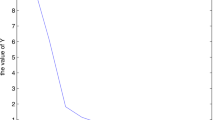Abstract
This paper is concerned with numerical methods for solving a semi-infinite programming problem. We reformulate the equations and nonlinear complementarity conditions of the first order optimality condition of the problem into a system of semismooth equations. By using a perturbed Fischer–Burmeister function, we develop a smoothing Newton method for solving this system of semismooth equations. An advantage of the proposed method is that at each iteration, only a system of linear equations is solved. We prove that under standard assumptions, the iterate sequence generated by the smoothing Newton method converges superlinearly/quadratically.
Similar content being viewed by others
References
Chen, X., Qi L. and Sun, D. (1998), Global and superlinear convergence of the smoothing Newton method and its application to general box constrained variational inequalities, Mathematics of Computation 67, 519-540.
Clarke, F.H. (1983), Optimization and Nonsmooth Analysis, Wiley, New York.
Coope, I.D. and Watson, G.A. (1985), A projected Lagrangian algorithm for semi-infinite programming, Mathematical Programming 32, 337-356.
Coope, I.D. and Price, C.J. (1998), Exact penalty function methods for nonlinear semi-infinite programming. In: Reemtsen, R.and Rückmann, J. (eds.), Semi-Infinite Programming, Kluwer Academic Publishers, Boston, pp. 137-157.
De Luca, T., Facchinei, F. and Kanzow, C. (1996), A semismooth equation approach to the solution of nonlinear complementarity problems, Mathematical Programming 75, 407-439.
Fischer, A. (1997), Solution of monotone complementarity problems with locally Lipschitzian functions, Mathematical Programming 76, 513-532.
Fukushima, M. and Qi, L. (1998), Reformulation: Nonsmooth, Piecewise Smooth, Semismooth and Smoothing Methods, Kluwer Academic Publishers, Boston, MA.
Gramlich, G., Hettich, R. and Sachs, E.(1995), Sqp-methods in semi-infinite programming, SIAM Journal on Optimization 5, 641-658.
Hettich, R. and Jongen, H. Th. (1978), Semi-infinite programming: conditions of optimality and applications, Lecture Notes in Control and Information Sciences 7, 1-11.
Hettich, R. and Kortanek, K. (1993), Semi-infinite programming: theory, methods and applications, SIAM Review 35, 380-429.
Janin, R. (1984), Direction derivative of the marginal function in nonlinear programming, Mathematical Programming Study 21, 127-138.
Kanzow, C. and Pieper, H. (1999), Jacobian smoothing methods for general complementarity problems, SIAM Journal on Optimization 9, 342-373.
C.T. Lawrence and Tits, A.L. (1998), Feasible sequential quadratic programming for finely discretized problems from SIP. In: Reemtsen, R.and Rückmann, J. (eds.), Semi-Infinite Programming, Kluwer Academic Publishers, Boston, pp. 159-193.
Li, D.H. and Fukushima, M. (2000), Smoothing Newton and quasi-Newton methods for mixed complementarity problems, Computational Optimization and Applications 17, 203-230.
Mangasarian, O.L. (1969), Nonlinear Programming, McGraw-Hill, New York.
Pang, J.-S. and Qi, L. (1993), Nonsmooth equations: Motivation and algorithms, SIAM Journal on Optimization 3, 443-465.
Polak, E. (1997), Optimization: Algorithms and Consistent Approximation, Springer, New York.
Polak, E. and Tits, A. (1982), A recursive quadratic programming algorithm for semi-infinite optimization problems, Applied Mathematics and Optimization 8, 325-349.
Qi, L.(1993), Convergence analysis of some algorithms for solving nonsmooth equations, Mathematics of Operations Research 18, 227-244.
Qi, L. and Chen, X. (1995), A globally convergent successive approximation method for several nonsmooth equations, SIAM Journal on Control and Optimization 33, 402-418.
Qi, L. (1999), Regular pseudo-smooth NCP and BVIP functions and globally and quadratically convergent generalized Newton methods for complementarity and variational inequality problems, Mathematics of Operations Research 24, 440-471.
Qi, L. and Jiang, H. (1997), Semismooth Karush-Kuhn-Tucker equations and convergence analysis of Newton methods and quasi-Newton methods for solving these equations, Mathematics of Operations Research 22, 301-325.
Qi, L. and Sun, D. (1999), A survey of some nonsmooth equations and smoothing Newton methods, in Eberhard, A., Glover, B., Hill, R. and Ralph, D. (eds.), Progress in Optimization: Contributions from Australasia, Kluwer Academic Publishers, Boston, 121-146.
Qi, L., Sun, D. and Zhou, G. (2000), A new look at smoothing Newton methods for nonlinear complementarity problems and box constrained variational inequalities, Mathematical Programming 87, 1-35.
Qi, L. and Sun, J. (1993), A nonsmooth version of Newton’s method, Mathematical Programming 58, 353-367.
Qi, L. and Wei, Z. (2000), On the constant positive linear dependence condition and its applications to SQP methods, SIAM Journal on Optimization 10, 963-981 Corrigendum, SIAM Journal on Optimization 11 (2001) 1145-1146.
Qi, L., Wu, S.-Y.and Zhou, G., Semismooth Newton for solving semi-infinite programming problems, to appear in: Journal of Global Optimization.
Reemtsen, R. and Görner, S. (1998), Numerical methods for semi-infinite programming: a survey. In Reemtsen, R. and Göckmann, J. (eds.), Semi-Infinite Programming, Kluwer Academic Publishers, Boston, MA, pp. 195-275.
Reemsten, R. and Rückmann, J. (1998), Semi-Infinite Programming, Kluwer Academic Publishers, Boston, MA.
Rückmann, J.J. and Shapiro, A. (2001), Second-order optimality conditions in generalized semi-infinite programming, Set-Valued Analysis 9, 169-186.
Shapiro, A.(1998), First and second order optimality conditions and perturbation analysis of semi-infinite programming problems. In: Reemsten, R. and Rückmann, J. (eds.), Semi-Infinite Programming, Kluwer Academic Publishers, Boston, MA, pp. 103-133.
Tanaka, Y., Fukushima, M. and Ibaraki, T. (1988), A globally convergent SQP method for semi-infinite nonlinear optimization, Journal of Computational and Applied Mathematics 23, 141-153.
Teo, K.L., Yang, X.Q. and Jennings, L.S. (2000), Computational discretization algorithms for functional inequality constrained optimization, Annals of Operations Research 98, 215-234.
Vo, B., Cantoni, A. and Teo, K.L. (1997), Envelope constrained filter with linear interpolator, IEEE Transactions on Signal Processing 45, 1405-1414.
Watson, G.A. (1981), Globally convergent methods for semi-infinite programming, BIT 21, 362-373.
Xiu, N. and Zhang, J. (2001), A smoothing Gauss-Newton method for the generalized HLCP, Journal of Computational and Applied Mathematics 129, 195-208.
Yamashita, N. and Fukushima, M. (1997), Modified Newton methods for solving semismooth reformulations of monotone complementarity problems, Mathematical Programming 76, 469-491.
Author information
Authors and Affiliations
Rights and permissions
About this article
Cite this article
Li, DH., Qi, L., Tam, J. et al. A Smoothing Newton Method for Semi-Infinite Programming. J Glob Optim 30, 169–194 (2004). https://doi.org/10.1007/s10898-004-8266-z
Issue Date:
DOI: https://doi.org/10.1007/s10898-004-8266-z





